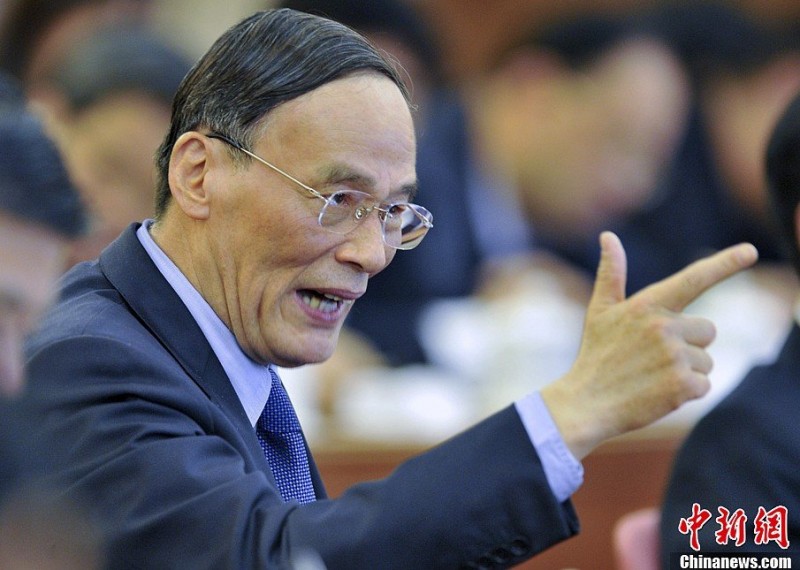
Wang Qishan, China's anti-graft campaign leader. Photo from China's state-run news wire China News.
Where is China’s anti-graft campaign going? Questions remain about whether the central government will issue an amnesty for the majority of the officials who have committed minor offences.
The chief of the party’s Central Commission for Discipline Inspection Wang Qishan's recent speech addressing the “four approaches” in party governance during his inspection tour in Fujian Province between 24-26 September left many wondering whether the anti-graft campaign was cooling down.
According to China's state media outlet Xinhua News, Wang stressed [1] that instead of adopting an antagonistic approach of defining a party member as either a “good comrade” or a “criminal,” the governing party apparatus should address the discipline of party members with four different approaches – criticism and self-criticism, minor disciplinary punishment, major disciplinary punishment and prosecution:
党内关系要正常化,批评和自我批评要经常开展,让咬耳扯袖、红脸出汗成为常态;党纪轻处分和组织处理要成为大多数;对严重违纪的重处分、作出重大职务调整应当是少数;而严重违纪涉嫌违法立案审查的只能是极极少数。
[We] should set up a norm for each party member, accepting criticism, self-criticism, reminders and embarrassing remarks as part of the daily norm. The majority should face minor party disciplinary punishment, those who are subjected to serious party disciplinary punishment or major duty adjustment should be the minority. Only a tiny minority would be prosecuted for serious disciplinary offences and suspected violations of the law.
Dozens of senior officials in the Chinese government and the army have been investigated since Xi Jinping launched a massive anti-graft campaign after he came to power in late 2012. Among these “criminal” officials are notorious ex-security czar Zhou Yongkang, Director of the party’s General Office Ling Jihua, and two previous Deputy-Presidents of the army.
Many China observers have criticized Xi for utilizing the campaign to strengthen his authority and curb rampant corruption among officials at the same time. The battle, however, has also exposed enormous amounts of corruption and some shocking scandals inside the party, leading to a shake-up of the public confidence in the party leadership.
On the other hand, since many economists have argued that China's economic growth has been driven by crony capitalism where government officials’ policy implementation is motivated by personal gain during their work with the investors and the private sector, the anti-graft campaign has impelled many government servants to inaction for fear of possible investigations. The side effect, however, is that the campaign seems to be hindering the economic reform plan set forth to rescue the slowing economy.
Wang’s statement has attracted significant attention from experts and netizens on China’s Twitter-like Weibo.
Liu Shengjun, a famous economist, believed [2] that Wang had sent a signal to adjust the anti-graft policies, and that it was likely that the party would offer amnesty to the majority of the officials who had committed minor disciplinary offenses:
与“重点查处十八大后不收敛”相呼应,此次提出“极极少数”,意在暗示对绝大多数官员进行有条件的特赦。这应被视为十八大以来反腐策略的一次重要调整。
[Wang's speech] is consistent with the “focus on investigating officials who don’t stop being corrupt after the 18th party congress,” the rhetoric of “a tiny minority” indicates the party would offer conditional amnesty to the majority of officials. This could be a significant adjustment of anti-corruption policy after the party’s 18th congress.
Zhang Ming, a well-known political scientist, called for [3] the construction of an anti-graft system to fundamentally address the problem of corruption:
反腐不能总是依赖非常手段,必须及早建构制度机制,实行釜底抽薪,让政府中人没有机会腐败。否则,这样反下去,事情会变得更糟。
Anti-corruption can’t always depend on special measures. The government must build a system to eliminate any chance for officials to engage in corruption. Otherwise the situation could become worse.
Some netizens are skeptical of the new political rhetoric and worry that it could provide an excuse for selective anti-corruption crackdowns. Instead, they have called for the disclosure of officials’ assets for public monitoring. Below are some of the comments [4] under economist Liu Shengjun's Weibo post about the anti-graft campaign:
共犯结构,全抓的话,架构就坍塌了
It is an accomplice political-economic system, if all corrupt officials are arrested, the whole system will disintegrate.
这不成了选择性反腐了吗?那就把前面抓的判的都放了吧!否则不公平!
Doesn't that sound like selective anti-corruption? Release the previously arrested officials, or it’s unfair!
搞那么多花腔干啥。财产公布了。全民帮你监督。纪委才多少人呀。效率还是低啊
There is no need for so much political rhetoric. The public will help you supervise officials after disclosing their assets. How many staff does the Central Commission for Discipline Inspector have? It’s inefficient for them [to do all the investigation].
反了这么长时间,我周围的贪官还是贪官,有卵用??
All the officials around are still corrupt since the lengthly anti-graft campaign was launched. What’s the use of it?
首先,腐败是犯罪行为,不存在审查多数少数之分,更没上下半场,这也说明,中国不是法治国家,法治仅仅是一个口号,还是党治。如今,各位也该看清楚了,反腐仅仅是为了排除异己,因为无官不贪……
First, corruption is a criminal act, regardless of whether a majority or a minority of the officials are involved. And anti-corruption efforts should not be divided into first and second phases. This indicates China is not a country upholding the rule of law. The rule of law is just a slogan, and party rule is still prominent. Now it is clear, the anti-graft [campaign] is only used to crack down on political opponents because all officials are corrupt……